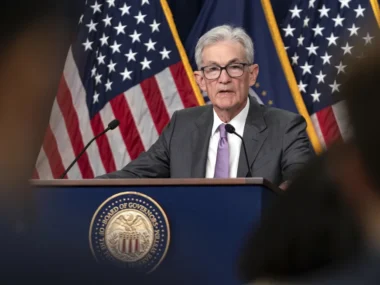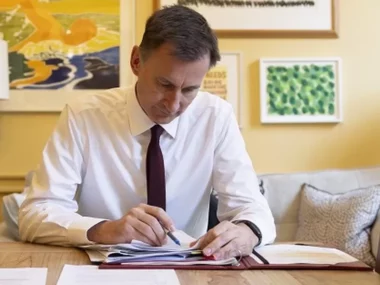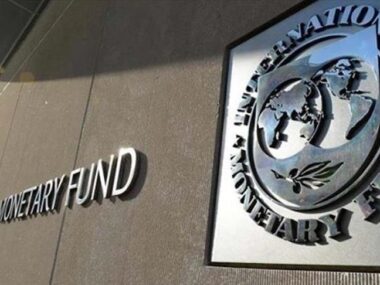The rate fell below the forecasted threshold in November, dropping to its lowest level in more than two years.
Following news of a significantly larger-than-expected decline in the UK’s annual inflation rate to 3.9% in November, the City expects interest rates to fall sharply next year.
Despite the Bank of England’s argument that it is too early to consider lowering borrowing costs, markets expect Threadneedle Street to deliver at least four interest rate cuts in 2024.
London share prices rose sharply after cheaper fuel and food helped reduce inflation from 4.6% in October to its lowest level since September 2021. The FTSE 100 Index gained about 1%, reaching its highest level since May.
With the economy faltering as a result of 14 consecutive interest rate increases between December 2021 and August 2023, economists projected the Bank would begin to ease policy next spring.
“Another significant drop in inflation in November only adds to the case that interest rates will fall sooner than expected,” said Ed Monk, an associate director at Fidelity International. The Bank of England has been tough, but price rises appear to be on a quick slide back towards the Bank’s target range, and the risk for rate-setters may soon be over-tightening rather than under-tightening.”
Swap rates in the City’s money markets were signaling a five-quarter-point fall, taking them from 5.25% to 4% by the end of next year, providing welcome respite to consumers and businesses whose borrowing costs have risen.
“Although Bank of England policymakers are at pains to push back against growing rate cut bets for 2024 while inflation remains well above target, the direction of travel for prices now appears clear,” said Kallum Pickering of Berenberg Bank. Although all key inflation indices remain over the Bank’s target of 2% year on year, the recent pattern shows that inflationary pressures are dissipating nearly as quickly as they started.”
The annual inflation rate fell by 0.2% in November, compared to a 0.4% rise in the same month last year, according to the Office for National Statistics (ONS). The main cause for the drop in the headline rate below 4% in November was cheaper gasoline, with the average price of petrol falling by four pence per litre month on month.
According to the ONS, food costs are also rising more slowly than a year ago, with bread and pastries falling in price compared to the previous month. Overall food costs rose 0.3% month on month and are still up 9.2% year on year, compared to 10.1% in October.
The ONS also stated that the cost of food and non-alcoholic beverages has risen by approximately 27% in the last two years, compared to an increase of approximately 9% between November 2011 and November 2021.
Although the 3.9% figure is nearly over the government’s 2% target, Rishi Sunak may now claim that he has met his target of halving inflation by 2023.
Forecasters in the city did not anticipate a repetition of October’s significant reduction in inflation from 6.7% to 4.4% in November. Core inflation, which excludes gasoline, food, alcohol, and tobacco, also declined dramatically last month, with cheaper household items and used automobiles helping to reduce the rate from 5.7% to 5.1%.
“With inflation more than halved, we are beginning to remove inflationary pressures from the economy,” said Chancellor Jeremy Hunt. However, many households continue to face high prices, so we will continue to prioritize steps that alleviate cost-of-living constraints.”
The shadow chancellor, Rachel Reeves, said: “Prices are still going up in the shops, household bills are rising and more than a million people face higher mortgage payments next year after the Conservatives crashed the economy.”
“Inflation eased again to its lowest annual rate in over two years,” said ONS chief economist Grant Fitzner, “but prices remain significantly higher than they were before the invasion of Ukraine.”
Ashley Webb, a UK economist at the consultancy Capital Economics, said the larger-than-expected decline in inflation would fuel financial market speculation that the Bank will begin decreasing interest rates in May of next year.
“The most striking feature of these data was the sharp reduction in domestic inflationary pressures.” Some of the drop in core inflation from 5.7% in October to 5.1% in November was due to the global influence of core goods inflation, which slowed from 4.3% to 3.3%.
“However, some of it was due to services inflation falling from 6.6% to 6.3%, leaving it well below the 6.9% rate the Bank projected at the time of its November monetary policy report.”











